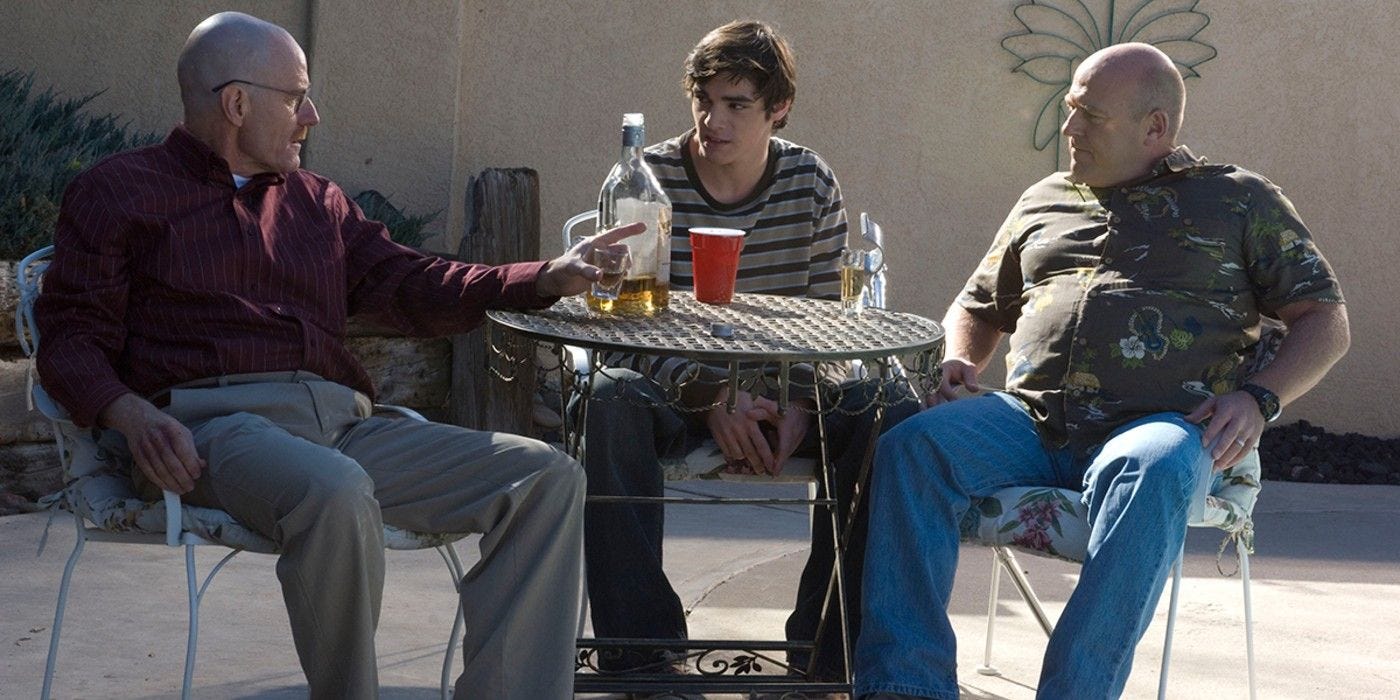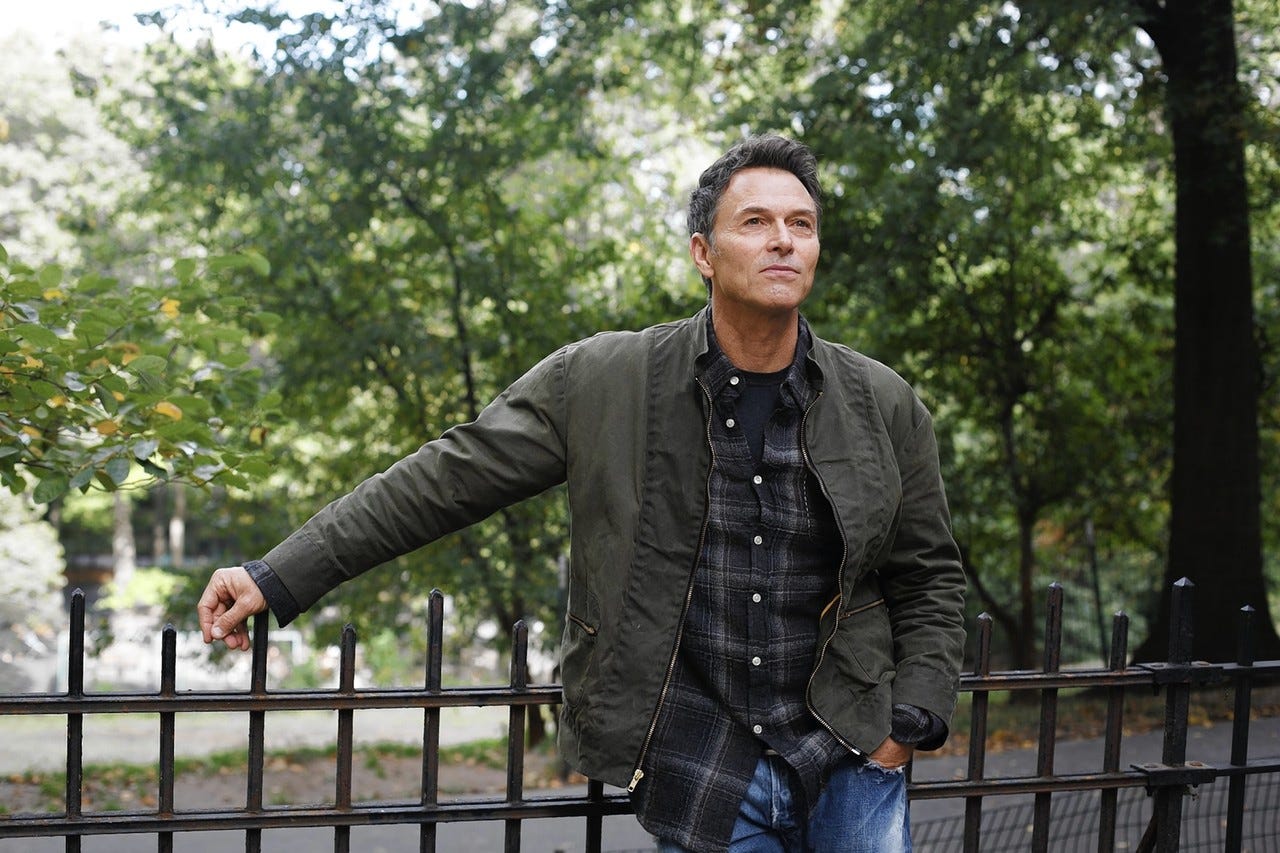
There are plenty of bad fathers in literature, such as Tolstoy’s Ivan Ilyich, who are directly cruel or withdraw from family life. There are also many nurturing types, none so kind and gentle as Cather’s Anton Rosicky, whose daughter-in-law pays him the ultimate compliment of trusting him with her pregnancy before anyone else knows.1 And there is a vast spectrum of other more complicated fathers, like Louise Erdrich’s Kurt Krahe, who are loving but flawed in the way that most of us are.
By contrast, popular culture typically casts fathers in one of two roles. There is the alpha type, like Peter Florrick in The Good Wife, who sometimes supports and sometimes obstructs an ambitious spouse. And there is the buffoon, a la Homer Simpson. Dr. Henry McCord of Madam Secretary is a welcome exception, though he reveals a new set of challenges for fathers who struggle to abandon their old prototypes even as they embrace more substantive roles.
A question that has historically haunted mothers might be just as germane for fathers today: can we really have it all?
The Pyrrhic Alpha
Both the alpha and the clown lie at the heart of Walter White’s tragic character in Breaking Bad. Walt is a conventional dad at the beginning of the show — stable, fully employed, present to his family — but he’s going through the motions. He missed his chance at being a true alpha when he sold his share of a lab startup to his grad school partners before it grew into a billion-dollar company. Teaching high school chemistry isn’t intellectually challenging, and his salary requires him to wash cars on the side to make ends meet.
Walt’s cancer diagnosis snaps him back to life, and he almost gets away with cooking meth to cover his treatment. But it’s a combination of ego and idiocy that does him in. He fills an entire storage unit with cash, more than his family would ever need, but he also has a childish urge to get credit as top dog. This comes out in dramatic ways, such as when he calls an erratic kingpin’s bluff by blowing out his windows with fulminated mercury, but also in private moments.
In one scene, he pours a tequila shot for his son Walter Jr. in front of his brother-in-law Hank, a federal drug enforcement agent. A small dose of bravado might have been endearing, but Walt keeps pouring the shots until they turn into punishment. By the time Walter Jr. is puking into the backyard pool, Walt has pushed his tough guy act to pyrrhic extremes.
This is heartbreaking, because Walt has a genuine bond with his son but seems driven to prove himself in ways that no one else expects of him and that eventually destroy his chance to be a father at all. Walt’s quixotic pursuit of respect recalls a line from Arthur Miller’s The Crucible when Elizabeth Proctor tells her husband, “I do not judge you. The magistrate sits in your heart that judges you.”
That’s true for a lot of men who had to pass their fathers’ tests of manhood. Not good enough shadows them for the rest of their lives.

Dads As Jokes
Then there are the TV dads who are only good for a laugh. The Al Bundy, Red Forman, Tim Taylor types. Bandit Heeler, of Bluey, might have a touch more insight into parenting than Homer Simpson, but just as often he’s a farting, bumbling punch line.
Many dad-moirs embrace comedy in this vein, perhaps because it’s safer, a way to defang masculinity. Dad jokes are also how Barack Obama and David Letterman play down their power.

Humor can take healing forms. In “The Comfort Zone,” Jonathan Franzen compares much of his family life to Charles Schulz’s Peanuts series. Near the end of his essay, Franzen recalls parodying his father’s hysterics about the family thermostat:
One evening, my mother and I started reminiscing about the old model, caricaturing my father’s temperature sensitivities, doing cartoons of the little heater’s faults, the smoke and the buzzing, and my father got mad and left the table. He thought we were ganging up on him. He thought I was being cruel, and I was, but I was also forgiving him.
I’ve always been known as a more serious type, but I embrace humor as a way to connect with my kids. My eldest is fond of the late Patrick McManus, who earned a reputation as the Mark Twain of the Pacific Northwest. When the kids are with me, we typically enjoy a chapter or two at bedtime of McManus’s adventures with the mountain man Rancid Crabtree, Pat’s friend Crazy Eddie Muldoon, and his dog Strange.
There is the unforgettable story “Mean Tents” about the time Pat and Crazy Eddie try to conquer their fear of the dark by camping in the backyard. Eddie’s dad arrives home late after listening to a radio show in which a mummy lurches after an archeologist, grunting, “Ur-uh, ur-uh.” The family dog also ambles home after sunset, unaware of the boys in their tent. When Pat and Eddie finally panic and try to run inside, they get tangled in the tent and drag it with them, mummy-like, startling the dog, whose bark comes out as “Ur-uh, ur-uh” as they all crash into the kitchen and scare the bejeezus out of Mr. Muldoon as he is gargling salt water.

McManus is a master of the reversal and the callback, and there’s more than a grain of truth in his portrait of fathers as overgrown boys. In “Sweet Sweet Sixteen,” he imagines an idyllic campout with his friend Vern, where he swears to stay sixteen forever. But he returns home to a surprise birthday party — his fiftieth.
Pat sputters,
“You know I’m not fif-fif…anywhere near that old. That’s the age of old geezers, like grandfathers.”
“Ha!” his wife replies. “And just who do you think these four short people sitting here with the party hats on are?”
“My grandchildren? You’re kidding! I thought they belonged to the neighbors.”
Pat muses that he could have accepted it if he’d aged gradually, but somehow he feels that he’s leaped straight from sixteen to “fif-fif…to half a century old.”
That joke was probably true of my grandfather’s generation, when pranks and weekend fishing trips didn’t look much different at the sawmill than they did in high school, and retirement offered a second boyhood. But we expect more of dads in our time even as the character types remain caricatures: fathers as little more than their billfolds, their groaners, or their gaffes. Sixteen forever, indeed.
Can Dads Have It All?
My favorite TV dad is Dr. Henry McCord of Madam Secretary. Henry is modeled after the alpha type, but unlike many contemporary characters he reflects changing attitudes toward fatherhood. One might even say that he raises the bar for what a father might be.
Before he became a professor, Henry McCord was a fighter pilot in the Marines. If that double dose of macho isn’t enough, we learn that he grew up in Pittsburgh, the son of a steel worker. These layers of his character are extreme, but they seem to function as a bridge between pyrrhic masculinity and a progressive message about fatherhood. You can be a man’s man and still study Thomas Aquinas. You can even find a home as a champion of the humanities in the National War College.

Henry occasionally struggles to communicate with his teenage daughters and takes a tough love approach to mentoring his son Jason. But he communicates to all of his children that they are more important than work. He is always there with a cup of coffee, a stack of pancakes, and a listening ear.
At times Dr. McCord is a little too perfect. Despite his hardscrabble upbringing, he seems to have no lingering class consciousness. He and his wife Elizabeth both came from nothing, and by the time they enter political life they seem to be, if not rich, well enough established that money is never a source of conflict between them. Henry seems to have no ego, no real needs. Just enough libido to be virile (no coincidence that he always wears his Marines shirt to bed), but not too much. And he always keeps a bar of fair-trade chocolate taped to the bottom of his desk for emergencies, though he never seems to eat any of it himself.
Dr. McCord weathers major life transitions with little impact on his identity, moving from Georgetown University to the National War College, sometimes assisting U.S. intelligence, serving as an ethics advisor to the President, and finally winding up as FGOTUS (First Guy of the White House). He is a world-renowned scholar, but spends no time actually doing scholarship.2 And whenever anyone needs a little advice, he’s always ready with a brainy quote from Aquinas.
All of that can make Henry McCord a little irritating, but we all have to suspend disbelief while watching television. I appreciate how Madam Secretary positions Henry as a moral anchor for the story. In one episode, he argues passionately against using AI to neutralize a terrorist. Like a good humanist, he sees the big picture, warning of an arms race in which countries produce deadly robots with no sense of responsibility for their actions. Henry is a good example of why Tracy Chou argues that every tech worker ought to have a humanities education.
Above all, I admire Dr. McCord’s adaptability as a character. He can be forceful when necessary, admonishing Elizabeth’s chief of staff to stop advising her as a woman and just let her be President. He manages to be protective without being patronizing and supportive without feeling invisible. If his children are disrespectful or distracted, or if Elizabeth isn’t listening, Henry rarely takes it personally. He gives his family space, demanding nothing, and they always gravitate back to him.
Tim Daly, who plays Henry McCord, says in this clip that men frequently tell him, “Thank God you play someone competent!”
Madam Secretary is a feminist show, and it is perhaps unsurprising for that reason that Henry’s relationship with his son Jason gets short shrift. But if one of the goals of the series is to reimagine American masculinity as compatible with female power, it could do more to show how Henry helps Jason along that path.
A common theme among the fathers I know is that they never had a conversation with their own fathers about what it meant to become a dad or how to do it well. Henry, likewise, seems to have had no guidance. Like nearly all of the men before him, he has been left to figure it out on his own. And so it is a pity that even though Jason has an excellent model for fatherhood, he learns nothing directly from Henry about how to carry that legacy forward.
Like Henry McCord, I have two daughters and a son. I try to raise them all to live toward Margaret Fuller’s vision of equality, which could serve as a précis for Madam Secretary.
We would have every arbitrary barrier thrown down. We would have every path laid open to woman as freely as to man. Were this done, and a slight temporary fermentation allowed to subside, we believe that the Divine would ascend into nature to a height unknown in the history of past ages, and nature, thus instructed, would regulate the spheres not only so as to avoid collision, but to bring forth ravishing harmony.
The world we live in is still a long way from the one Fuller imagined and the one that the McCords help us escape into for a time. I am nowhere near Henry McCord’s equal as a father, but I’m glad to have him to fall back on when I grow weary of reading another book to my kids that either has no father in it or that imagines fathers as little more than overgrown boys learning the hard way not to pee on the electric fence.
Subscribe to The Recovering Academic
Unlock more essays, interviews, and craft resources
This is one of the scenes I love best from Cather’s short fiction. Anton Rosicky has been concerned about his son Rudolph and his wife Polly, because they seem to be having a hard start as a married couple. So he looks out for them, sending them into town for some fun, hoping to help them along. When a heart attack seizes Rosicky near the end of the story, Polly is the one to help him, and during a respite between the first attack and the one that claims his life, Polly reveals her pregnancy to him. She feels, in that moment, as he closes his eyes and rests, “half-smiling,” that “nobody in the world, not her mother, not Rudolph, or anyone, really loved her as much as old Rosicky did.”
Anyone familiar with how higher ed works knows how much time a leading scholar must spend in the archives, at conferences, alone in a room writing the next book. I’m not sure I recall one scene from Madam Secretary that shows Henry absenting himself in this way. In fact, it’s as if his academic title is little more than a sexy status marker.


Thanks for posting this again, reworked. Nice. The only advice my father ever gave to me about being a father was not to make the mistakes he did. It was good advice, and I don't think I did.
I also loved the portrayal of the Dad figure in The West Wing, as I also enjoyed the female president (I’m not one for recalling actors names.. oops.)
Being a parent is tough. Period. Full stop.
As I look back thru my kids younger years I see my flaws so clearly. And even now, the relationships with my daughters remain a living, breathing, changing thing. We love powerfully, and deeply.
I do take one exception to something you refer to ever so briefly… Barack Obama has never portrayed himself as “bumbling” in my awareness….. humble yes, fabulous Dad jokes yes, but bumbling? Nope. he’s always been that generous, strong willed, powerfully ethical, intelligent, kind, and real humans I am aware of.